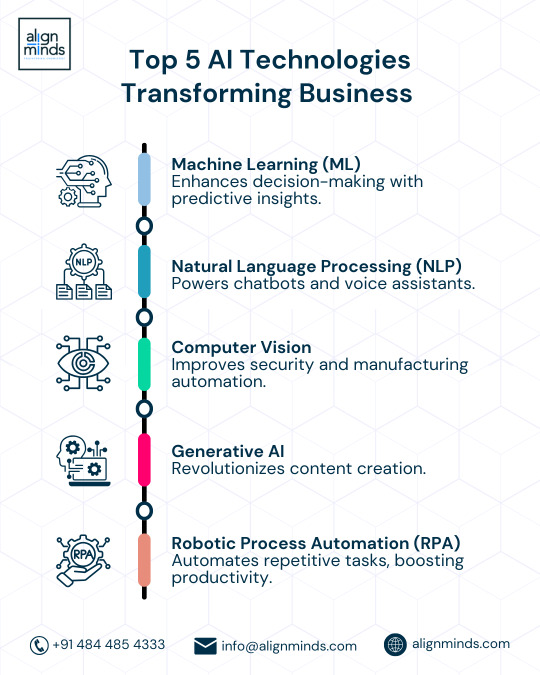#conversational ai development
Explore tagged Tumblr posts
Text
Conversational AI for Sales: Automate Conversions with Smart Chatbots

Boost sales and customer retention with AI-powered chatbots. Our conversational AI development brings automation, personalization, and performance to every sales interaction.
0 notes
Text
The Power of Conversational AI
Conversational AI represents a paradigm shift in human-computer interaction, leveraging advanced technologies such as Natural Language Processing (NLP) and machine learning to enable machines to understand, interpret, and respond to human language in a remarkably natural way. This transformative field empowers businesses and individuals alike by providing intelligent virtual assistants, chatbots, and voice-activated systems that enhance customer engagement, streamline processes, and bring a new level of efficiency to a wide array of industries. Join us on a journey into the future of communication, where Conversational AI transcends mere automation to create meaningful and personalized interactions.
#conversational ai#conversational ai solutions#conversational ai development#conversational ai development company
0 notes
Text
it's interesting talking to young men on the internet because they are, by a large majority, motivated by a gleeful and unfocused ressentiment towards basically everyone and everything. there is really very little concern for truth but more notably there is a semi-concious rejection of usefulness of action and of making things better.
the appeal of policies, actions or rhetoric is that punishment and cruelty are inflicted, that people and entities are laid low. they are not motivated by a desire for better things to happen, but for worse things to happen to those they resent. And they like being angry and resentful, they like it more than they like any hobby or activity or product.
#eg they would rather specific game developers suffer and even be killed than for good game developers to succeed#a huge appeal of AI art to young men is that it creates the desired consumable output while causing suffering.#they specifically like that it makes the lives of artists worse because they hate them more for “bad” art/behaviour#than they like the creators of “good” art#even if these people had money and power. even if they felt they were on top#they would still prioritise making those they resent suffer over benefiting themselves directly#it's obviously not all but wow is it a large portion#and the thing is you can actually have normal conversations#if you can break them out of their constant and self reinforcing outrage loops#the gender politics gap among zoomers is real my friends
81 notes
·
View notes
Text
Can we start a dialogue here about AI? Just to start, I’ll put a few things out there.
As a student, did you ever use AI to do your work for you? If so, to what extent?
Are you worried about AI replacing your job?
What are your other concerns about AI?
50 notes
·
View notes
Text
"the reason adrien is just instantly good at everything he tries is because he is programmed to be that way as a senti" aside from the fact that i don't think that's how it works (and also while he was decent at everything he tried with marinette he wasn't instantly good at all of them, and what marinette actually said to him was that he could improve in anything with practice but it was a great first attempt) did we all collectively forget about how adrien actually canonically isn't the best singer?

#adrien agreste#miraculous#miraculous ladybug#ml s6 spoilers#ml season 6#ml climatiqueen#miraculous spoilers#ml spoilers#actually never saw that episode in french so maybe the french voice actor did a better job idk but given that adrien doesn't#usually sing for kitty section or ever the way i saw it was he used his poetry writing skills to write a song#and as a songwriter he was probably great but being a good lyricist doesn't make you a great singer obviously#so to me that's what his deal is#i actually like that throughout this show adrien has some things he picks up easily and some things he has to work on and might never do as#well as people with more experience#i also think as a kids show the lesson they want to put out is anyone can improve with effort and attempt#like he fumbled that science lab experiment but enjoys particle physics#languages tend to come easily to him precisely because it's been something he was forced to do since he was young#a lot of polygots especially if they start young develop skills and see linguistic patterns and iirc he already knew some#japanese from anime and his familiarity with mandarin should help#but i love that he took it further and took on morse code like the cute nerd he is#and now he's studying ancient greek for fun??? what a cute#marinette says his macarons tasted fine but we saw him struggle with the creme#what i mean to say is#he has discipline (basically second nature now) and dedication so he can do well but it DOES require effort#and i think it dismisses how much adrien TRIES or the fact that a lot of skills he was taught to have since a young age aid him#and i just don't think all sentis are “perfect” in an AI robotic way (even if that's how their parents wished they were)#it also just lessens his humanity and iirc the writers have stated multiple times that they are still human#(we can discuss how inconsistent ml is about sentis in general but eh idc for that conversation tbh agdhsjsjks)#anyway adrien will forever be#my nerdy son i love him so much
48 notes
·
View notes
Note
AI post you might be interested in:
https://www.tumblr.com/sea-shelly/785869735518715904?source=share
i just finished reading someone's annual self-assessment form, which was so obviously AI-generated that i went to copilot (the tool our institution pushes), plugged in the review questions with some basic instructions, and had it immediately spit out virtually the exact same content this person had sent to me. then i came to tumblr and read this post, which so perfectly sums up the experience of reading AI-generated text. the words make sense. they form sentences that convey some basic information. but my brain just sort of slides over the sentences without absorbing anything, because nothing real or substantive is being communicated. it's nothingness. it's white noise text. it's empty calorie content. it fills space without conveying anything all about what the person believes, who they are, what makes them tick, what their little expressive quirks are, how they see and make sense of the world. it depresses me so fucking much. and 'slop' is the perfect word for it. it's just slop. it's horrible. it's such a waste of my one wild & precious life to read this shit and to have to engage with it like it's something this person really worked on, instead of something a computer spat out for them in .02 seconds so they could get back to scrolling social media.
#and now i have to have a conversation with this person in their annual review where i say basically like#i find it hard to trust you with large projects because you are not using your own brain to do them#and the content you generate for them requires me to do so much editing and revising and coaching of the slop you've given me#that it's actually just easier for me to do it first#ugh i know that is not like an actual long-term solution and it's not helping this person grow! but i'm just like#i don't know how to have a conversation with you about this when you proudly tell everyone about how you've developed a personal AI bot#that is your 'thought partner'
17 notes
·
View notes
Text
#ProjectBatman Threat Level!


So I've been having fun talking to some IA lately, and I asked them to classify the level of threat that I present, I described an individual and he classified it as such. He stated that I present a low risk of starting any threatening situations, but also that I'm highly capable of harm. (which is kinda the point of Batman).



They said I could be useful in extreme situations, and that has always been the focus of my training so I asked what other skills I could develop to be even more useful if needed. And that's the list above.



And this was the order they said I could develop, I'm curious about it. I'm already studying different languages and coding, so I'm thinking about doing a first response medical course and maybe a survival skills one!

#batman#project batman#bruce wayne#martial arts#training#fitness#exercise#work out#kung fu#duolingo#polymath#polyglot#threat level#threat#first response#skills development#defense specialist#budoblr#superhero fitblr#firblr#coding#emergency response#survival skills#medical skills#AI conversations
2 notes
·
View notes
Text

AI’s Second Chance: How Geometric Deep Learning Can Help Heal Silicon Valley’s Moral Wounds
The concept of AI dates back to the early 20th century, when scientists and philosophers began to explore the possibility of creating machines that could think and learn like humans. In 1929, Makoto Nishimura, a Japanese professor and biologist, created the country's first robot, Gakutensoku, which symbolized the idea of "learning from the laws of nature." This marked the beginning of a new era in AI research. In the 1930s, John Vincent Atanasoff and Clifford Berry developed the Atanasoff-Berry Computer (ABC), a 700-pound machine that could solve 29 simultaneous linear equations. This achievement laid the foundation for future advancements in computational technology.
In the 1940s, Warren S. McCulloch and Walter H. Pitts Jr introduced the Threshold Logic Unit, a mathematical model for an artificial neuron. This innovation marked the beginning of artificial neural networks, which would go on to play a crucial role in the development of modern AI. The Threshold Logic Unit could mimic a biological neuron by receiving external inputs, processing them, and providing an output, as a function of input. This concept laid the foundation for the development of more complex neural networks, which would eventually become a cornerstone of modern AI.
Alan Turing, a British mathematician and computer scientist, made significant contributions to the development of AI. His work on the Bombe machine, which helped decipher the Enigma code during World War II, laid the foundation for machine learning theory. Turing's 1950 paper, "Computing Machinery and Intelligence," proposed the Turing Test, a challenge to determine whether a machine could think. This test, although questioned in modern times, remains a benchmark for evaluating cognitive AI systems. Turing's ideas about machines that could reason, learn, and adapt have had a lasting impact on the field of AI.
The 1950s and 1960s saw a surge in AI research, driven by the development of new technologies and the emergence of new ideas. This period, known as the "AI summer," was marked by rapid progress and innovation. The creation of the first commercial computers, the development of new programming languages, and the emergence of new research institutions all contributed to the growth of the field. The AI summer saw the development of the first AI programs, including the Logical Theorist, which was designed to simulate human reasoning, and the General Problem Solver, which was designed to solve complex problems.
The term "Artificial Intelligence" was coined by John McCarthy in 1956, during the Dartmouth Conference, a gathering of computer scientists and mathematicians. McCarthy's vision was to create machines that could simulate human intelligence, and he proposed that mathematical functions could be used to replicate human intelligence within a computer. This idea marked a significant shift in the field, as it emphasized the potential of machines to learn and adapt. McCarthy's work on the programming language LISP and his concept of "Timesharing" and distributed computing laid the groundwork for the development of the Internet and cloud computing.
By the 1970s and 1980s, the AI field began to experience a decline, known as the "AI winter." This period was marked by a lack of funding, a lack of progress, and a growing skepticism about the potential of AI. The failure of the AI program, ELIZA, which was designed to simulate human conversation, and the lack of progress in developing practical AI applications contributed to the decline of the field. The AI winter lasted for several decades, during which time AI research was largely relegated to the fringes of the computer science community.
The AI Winter was caused by a combination of factors, including overhyping and unrealistic expectations, lack of progress, and lack of funding. In the 1960s and 1970s, AI researchers had predicted that AI would revolutionize the way we live and work, but these predictions were not met. As one prominent AI researcher, John McCarthy, noted, "The AI community has been guilty of overpromising and underdelivering". The lack of progress in AI research led to a decline in funding, as policymakers and investors became increasingly skeptical about the potential of AI.
One of the primary technical challenges that led to the decline of rule-based systems was the difficulty of hand-coding rules. As the AI researcher, Marvin Minsky, noted, "The problem with rule-based systems is that they require a huge amount of hand-coding, which is time-consuming and error-prone". This led to a decline in the use of rule-based systems, as researchers turned to other approaches, such as machine learning and neural networks.
The personal computer revolutionized the way people interacted with technology, and it had a significant impact on the development of AI. The personal computer made it possible for individuals to develop their own software without the need for expensive mainframe computers, and it enabled the development of new AI applications.
The first personal computer, the Apple I, was released in 1976, and it was followed by the Apple II in 1977. The IBM PC was released in 1981, and it became the industry standard for personal computers.
The AI Winter had a significant impact on the development of AI, and it led to a decline in interest in AI research. However, it also led to a renewed focus on the fundamentals of AI, and it paved the way for the development of new approaches to AI, such as machine learning and deep learning. These approaches were developed in the 1980s and 1990s, and they have since become the foundation of modern AI.
As AI research began to revive in the late 1990s and early 2000s, Silicon Valley's tech industry experienced a moral decline. The rise of the "bro culture" and the prioritization of profits over people led to a series of scandals, including:
- The dot-com bubble and subsequent layoffs.
- The exploitation of workers, particularly in the tech industry.
- The rise of surveillance capitalism, where companies like Google and Facebook collected vast amounts of personal data without users' knowledge or consent.
This moral decline was also reflected in the increasing influence of venture capital and the prioritization of short-term gains over long-term sustainability.
Geometric deep learning is a key area of research in modern AI, and its development is a direct result of the revival of AI research in the late 1990s and early 2000s. It has the potential to address some of the moral concerns associated with the tech industry. Geometric deep learning methods can provide more transparent and interpretable results, which can help to mitigate the risks associated with AI decision-making. It can be used to develop more fair and unbiased AI systems, which can help to address issues of bias and discrimination in AI applications. And it can be used to develop more sustainable AI systems, which can help to reduce the environmental impact of AI research and deployment.
Geometric deep learning is a subfield of deep learning that focuses on the study of geometric structures and their representation in data. This field has gained significant attention in recent years, particularly in applications such as object detection, segmentation, tracking, robot perception, motion planning, control, social network analysis and recommender systems.
While Geometric Deep Learning is not a direct solution to the moral decline of Silicon Valley, it has the potential to address some of the underlying issues and promote more responsible and sustainable AI research and development.
As AI becomes increasingly integrated into our lives, it is essential that we prioritize transparency, accountability, and regulation to ensure that AI is used in a way that is consistent with societal values.
Transparency is essential for building trust in AI, and it involves making AI systems more understandable and explainable. Accountability is essential for ensuring that AI is used responsibly, and it involves holding developers and users accountable for the impact of AI. Regulation is essential for ensuring that AI is used in a way that is consistent with societal values, and it involves developing and enforcing laws and regulations that govern the development and use of AI.
Policymakers and investors have a critical role to play in shaping the future of AI. They can help to ensure that AI is developed and used in a way that is consistent with societal values by providing funding for AI research, creating regulatory frameworks, and promoting transparency and accountability.
The future of AI is uncertain, but it is clear that AI will continue to play an increasingly important role in society. As AI continues to evolve, it is essential that we prioritize transparency, accountability, and regulation to ensure that AI is used in a way that is consistent with societal values.
Prof. Gary Marcus: The AI Bubble - Will It Burst, and What Comes After? (Machine Learning Street Talk, August 2024)
youtube
Prof. Gary Marcus: Taming Silicon Valley (Machine Learning Street Talk, September 2024)
youtube
LLMs Cannot Reason (TheAIGRID, October 2024)
youtube
Geometric Deep Learning Blueprint (Machine Learning Street Talk, September 2021)
youtube
Max Tegmark’s Insights on AI and The Brain (TheAIGRID, November 2024)
youtube
Michael Bronstein: Geometric Deep Learning - The Erlangen Programme of ML (Imperial College London, January 2021)
youtube
This is why Deep Learning is really weird (Machine Learning Street Talk, December 2023)
youtube
Michael Bronstein: Geometric Deep Learning (MLSS Kraków, December 2023)
youtube
Saturday, November 2, 2024
#artificial intelligence#machine learning#deep learning#geometric deep learning#tech industry#transparency#accountability#regulation#ethics#ai history#ai development#talk#conversation#presentation#ai assisted writing#machine art#Youtube
2 notes
·
View notes
Text
Talk Tech: Build a Custom Conversational AI Chatbot That Converts

Deploy AI-powered chatbots that engage, qualify, and support users with real-time conversations and intelligent flows. Build voice- and text-based bots with advanced Conversational AI development services that redefine engagement.
#Conversational ai development#Conversational ai chatbot#Conversational ai companies#Best conversational ai#Conversational ai for sales
0 notes
Text
Conversational AI Solutions Development Company in India
Contaque is a leading Conversational AI solutions development company in India, offering intelligent chatbots and virtual assistants for seamless customer interactions. Our AI-powered solutions understand natural language, providing quick and accurate responses across multiple channels like voice, chat, and email. With machine learning and NLP capabilities, our chatbots handle FAQs, automate workflows, and improve response times. Whether for banking, e-commerce, or healthcare, our AI solutions enhance customer engagement while reducing operational costs. Elevate your contact center’s efficiency with Contaque’s cutting-edge Conversational AI technology for smarter customer communication
1 note
·
View note
Text
Cut Through the Noise: Embrace Authentic Marketing to Build Lasting Connections
Discover the secrets to authentic marketing with Chelsey's latest post: Cut Through the Noise! Dive into the power of authenticity, transparency, and real connections to build lasting relationships in the digital age. 🌟 #MarketingTips #DigitalMarketing
Chelsey’s blog post emphasizes returning to marketing basics—authenticity, transparency, and genuine connections—to cut through digital overload. Using examples like Patagonia and TOMS Shoes, she illustrates how these principles build trust and loyalty, creating lasting impacts in the digital age. BY Chelsey’s Curations July 28,…

View On WordPress
#Ai#Ai driven#AI-drive#Ai-driven#Authenticity#automation#bloggers#brand making#brands#brnads#business development#Chelseys Curations#ChelseysCurations#consumers#Content Marketing#Conversational marketing#Digital fundamentals#Digital Marketing#Digital Overload#diy#diy entrepreneurs#driven content#ecommerce#Genuine connections#human interaction#innovative#innovative marketing#marketing fundamentals#new brands#Personal Development
2 notes
·
View notes
Text
it was a mistake having that thought, now im feeling slightly abnormal
#ghost once said#like. like. hear me out on SPEAKER and hale.#both of them died (but ended up fine minus the trauma) bcz of SAYER . hale has no memories of earth.#SPEAKER is the earth based AI. both of them have some sort of connection to SAYER and both played a great part in-#-SAYER's character development.#and like. hale would need guidance in managing life earth on account of his amnesia#and who knows earth better than SPEAKER?#but i also really want them to have a conversation about SAYER itself#and i need to beg the question of ''would he (hale) miss it?''
3 notes
·
View notes
Text
Experts in Google Cloud Platform (GCP) Adopting the latest Google Cloud technologies drives advanced capabilities in data management, advanced analytics, and machine learning with the performance and cost reductions that business leaders seek. Get in touch Our working with Google Cloud ZapAI is specializing in Data Analytics solutions.
2 notes
·
View notes
Text



GOLS EdTech Off‑the‑Shelf Course Library
GOLS EdTech’s Off‑the‑Shelf Course Library is a robust, ready‑made solution designed to help organizations implement comprehensive training quickly, cost‑effectively, and with high impact. Tailored for businesses and institutions investing in workforce development, this curated collection delivers deep, versatile training options across essential professional domains
📚 Core Features & Content Areas
The library is rich with SCORM‑compliant, multi‑format courses developed by subject‑matter experts. Key topics include (but are not limited to):
Compliance Training – Covering critical subjects such as data protection, regulatory requirements, workplace ethics, and harassment prevention.
Leadership & Management – Teaching skills in team leadership, decision‑making, and people management.
Customer Focus – Modules centered on building empathy, handling objections, problem‑solving, and managing client relations
Diversity and Inclusion – Cultivating inclusive workplace culture with awareness and bias‑reduction modules.
Remote Working – Addressing remote team integration, culture build‑out, work–life balance, and preventing remote harassment
Stress & Resilience – Helping learners manage mental health, stress, resilience, and self‑care.
Industry‑specific Content – In sectors like manufacturing, government, healthcare, and finance, there are courses tailored to niche requirements such as OSHA compliance, project management, policy implementation, and cybersecurity
These courses often include dynamic formats—video segments, interactive quizzes, scenario‑based learning, case studies, and mobile‑friendly deployment.
Why This Offering Stands Out
Rapid Deployment Off‑the‑Shelf courses eliminate the lead time of custom development. Organizations can roll out training programs within days or weeks, avoiding months of build time.
Cost‑Efficiency Pre‑built courses substantially reduce per‑learner costs. For standard training needs—new hire onboarding, compliance requirements, or skills reinforcement—it’s a highly economical model.
Multimedia & Interactivity Learners engage with rich media—videos, simulations, case studies—offsetting waning attention spans and increasing knowledge retention. The customer‑focus modules include real‑world role‑plays and empathy exercises
Scalability & Accessibility All courses are mobile-compatible and deployable across GOLS’ LMS platform or other SCORM‑enabled systems, ensuring seamless access anywhere in the world
Continual Expansion & Updates GOLS maintains ongoing updates and periodically adds new modules to keep content current—an important advantage for industries facing frequent regulatory change.
How It Fits Into Broader Learning Ecosystems
GOLS EdTech integrates its Off‑the‑Shelf Course Library with its wider digital learning ecosystem, including:
GOLS LMS Platform – A fully managed learning platform for hosting, managing, and tracking training outcomes. It supports analytics, SCORM/xAPI compliance, mobile access, and API‑based integrations
Custom Course Services – For organizations needing highly specific or branded content, GOLS offers tiered interactive custom development. These range from basic “page‑turner” courses to advanced gamified simulations .
eLearning Consulting – Advisory services backed by instructional design and technical expertise assist clients in choosing the correct mix of off‑the‑shelf and custom courses, and implementing them within their learning strategies.
Who Should Use It
The Off‑the‑Shelf Library is ideal for:
Enterprises needing standard training (e.g., compliance, remote work, leadership).
Growing businesses wishing to onboard and upskill quickly.
Resource-limited teams that want cost-effective, ready-made content without the overhead of developing in-house courses.
Organizations with diverse audiences requiring scalable, multilingual, device-agnostic training.
Example Scenario
A multinational financial firm must train 10,000 employees on a new data privacy regulation within a tight timeframe. GOLS’ off-the-shelf Compliance course can be instantly deployed via GOLS LMS or an existing LMS, tracking completion in real time and ensuring regulatory adherence—with no development turnaround delays.
Final Thoughts
GOLS EdTech’s Off‑the‑Shelf Course Library offers a well-rounded, strategic training toolkit: swift deployment, compelling multimedia, and expert-crafted content across essential workplace skills. It works seamlessly within GOLS’ broader platform ecosystem and enables organizations to deliver scalable, engaging, and measurable learning experiences—without stretching budgets or waiting weeks to launch.
If you’d like to explore specific course samples or discuss deployment strategies, GOLS offers demos and free trials to fit your constraints.
#You said:#https://openai.com/index/chatgpt/ Description for this URL https://golsedtech.com/off-the-shelf-courses/#ChatGPT said:#Here’s a concise overview of the two URLs you provided:#🔹 ChatGPT – OpenAI#ChatGPT is a conversational AI developed by OpenAI#designed to interact in a dialogue format. This allows it to answer follow-up questions#admit mistakes#challenge incorrect premises#and reject inappropriate requests. It is a sibling model to InstructGPT#trained to follow instructions and provide detailed responses.#openai.com#🔹 GOLS EdTech – Off-the-Shelf Courses#GOLS EdTech offers a comprehensive library of over 100 ready-to-deploy eLearning courses#covering topics such as compliance#leadership#customer focus#diversity and inclusion#remote working#and stress management. These courses are SCORM-compliant#accessible across devices#and available in multiple formats including microlearning and video modules. GOLS has partnered with Intellezy and BizLibrary to provide a#ensuring effective and engaging learning experiences.#maestrolearning.com#+4#golsedtech.com#learningpool.com#If you need further details or assistance with either platform#feel free to ask!#Sources
0 notes
Text
Why Generic Bots Fail and Custom Chatbot Development Wins?

In the digital world of today, businesses are always on the lookout for ways to interact with their customers smarter, faster, and in a more engaging manner. One of the breakthroughs in these interactions are chatbots. Custom ChatBot Development Services has proven to be a game changer by offering unique tailored experiences, providing better operational efficiency, and return on investment that is tangible.
In contrast, off-the-shelf bots do not meet expectations and generic, one-size-fits-all solutions fail because companies do not take the time to analyze how custom solutions work.
In this article, I will explain how conversational AI can be utilized by companies based in the UAE and other countries in the Middle East.
The Failure of Generic Bots
1. Insufficient Understanding of Context
Because off-the-shelf chatbots and bots tailored to serve broad audiences with pre-programmed responses lack flexibility, they are unable to respond to the specific needs of your business and your clients.
They often rely on static decision trees
Cannot handle complex queries
Provide generic responses that frustrate users
Due to the lack of personalization, users experience frustration resulting in potential customers being lost.
2. Rigid Workflows
Most of the pre-built bots available come with specific conversation flows that do not match your business operations. Forcing your business processes to fit the bot is not ideal, as it would mean having to adapt your workflows to the restricted capabilities of the bot.
Difficult to integrate with CRM, ERP, or other third-party applications
Cannot adapt to changing business requirements
Limited options for customization
3. Lack of Linguistic Proficiency
In markets like UAE that are linguistically rich and diverse, a bot’s inability to support more than one language or dialect is a dealbreaker. Most operators use off-the-shelf bots that support a limited number of languages and are poor at natural language processing.
4. Information Security Risks
The majority of off-the-shelf chatbot platforms have entry-level security measures. When handling sensitive customer data, generic bots pose a huge risk of breach, especially in sectors such as finance, healthcare, and e-commerce.
5. Weak Integration with Business Intelligence
Off-the-shelf bots are unable to integrate deeply with analytical tools and, as a result, are unable to gather valuable insights on user engagement, conversion rates, or net promoter scores.
Why Custom ChatBot Development Services Are Better
With an investment in Custom ChatBot Development Services, businesses receive a solution that is developed specifically for them. Here is why compared to off-the-shelf solutions, custom bots have more advantages:
1. Tailored User Experiences
Custom bots can mirror company brands, allowing for a tailored user experience. Bots are able to recall user preferences, suggest items tailored to their specific needs, and respond to intricate queries.
Automated dynamic replies to greet users
Users’ paths are enhanced through analytics
Omnichannel support (web, mobile, WhatsApp, etc)
2. Deep Integration Capabilities
Custom bots can connect with internal systems such as CRMs (Salesforce), ERPs, payment systems and customer databases effortlessly.
Assist in qualifying and nurturing leads
Fetch live data from back-end systems
Align with other business processes
3. Multilingual and NLP-Driven
Custom solutions can incorporate sophisticated NLP engines and multilingual features, especially in UAE that requires English, Arabic, Hindi and other languages.
Enhanced understanding of intent and context
Text, voice, and hybrid communication support
Custom NLP models trained on your data
4. Scalable and Future-Proof
Custom chatbots are built with scalability in mind. With business growth or shift in requirements, the chatbot can be customized to adapt to the changes.
Modular architecture
Easily updated features and logic
API-first design accommodating future integrations
5. Improved Security & Compliance
With a custom solution, complete control over security protocols is provided. Ensuring compliance with GDPR, HIPAA, and other data protection regulations is possible.
End-to-end encryption
Role-based access controls
Secure protocols for data storage and transfer
Real-World Use Cases Where Custom Chatbots Shine
1. E-Commerce
Automated upselling and cross-selling
Tracking orders and managing returns
Product recommendations personalized for each customer
2. Healthcare
Automated appointment setting and reminders
AI-based symptom triaging
Privacy of patient information and compliance with HIPAA standards
3. Banking and Finance
Customer support around the clock
Automation of onboarding new clients with KYC
Alerts for fraudulent activities
4. Real Estate
Qualification and capture of leads
Chatbot-enabled virtual tours of properties
Support for documentation and mortgage calculation
5. Hospitality
Assistance for booking hotel rooms
Support for loyalty programs
On-demand guest services and concierge support
The UAE Advantage: Why Custom Chatbots Are a Must
The UAE market is unique. A smart population, high smartphone penetration, and a government encouraging digital transformation (like Smart Dubai) puts businesses under strain to provide a premier customer experience.
In today's world, developing a custom chatbot isn’t just optional – it’s becoming essential. Those who still rely on generic bots as a primary option will always be at risk of falling behind their competitors who are smarter and are using adaptive solutions.
Finding the Right Partner for Custom ChatBot Development Services
Your choice of development team for a custom chatbot solution will determine your success. A trustworthy partner will:
- Recognize business challenges, and the ideal customer
- Offer full scope development (strategy, design, implementation, support)
- Provide post launch maintenance and value addition.
- Provide analytics and KPIs for results evaluation.
Here at WDCS Technology, we build tailored AI-driven chatbots specifically for businesses in the UAE. We take care of every step from ideation to ensure your bot becomes a digital asset for you.
Final Thoughts
On the other hand, Custom ChatBot Development Services provide a strategic advantage that drives up engagement, operational cost reduction, and makes the business future-ready.
In the fiercely competitive digital economy in the UAE, where customer satisfaction is a top priority, custom chatbots are not just better, they are a necessity.
Are You Prepared to Create a Business Chatbot That Operates Effectively for You?
Change the way you interact with your clients today!
Achieve real business goals with WDCS technology's effective custom chatbot development services.
#Custom ChatBot Development Services#Chatbot UAE#AI Bots#Conversational AI#UAE Digital Transformation#hire chatbot developers
0 notes
Text

AI Technologies Transforming Business
AI technologies are revolutionizing business by automating tasks, enhancing decision-making, improving customer experiences, and driving innovation. From predictive analytics to chatbots and AI-driven insights, companies gain efficiency, agility, and competitive advantage.
#ai development company#conversational ai#digital transformation company#ai service#ai technology#artificial intelligence
0 notes